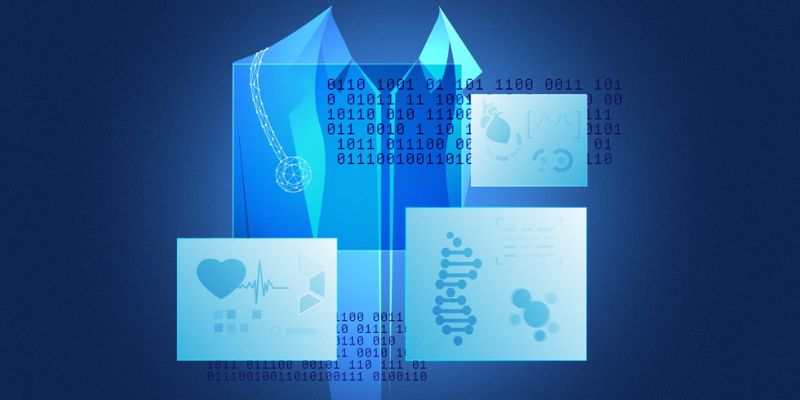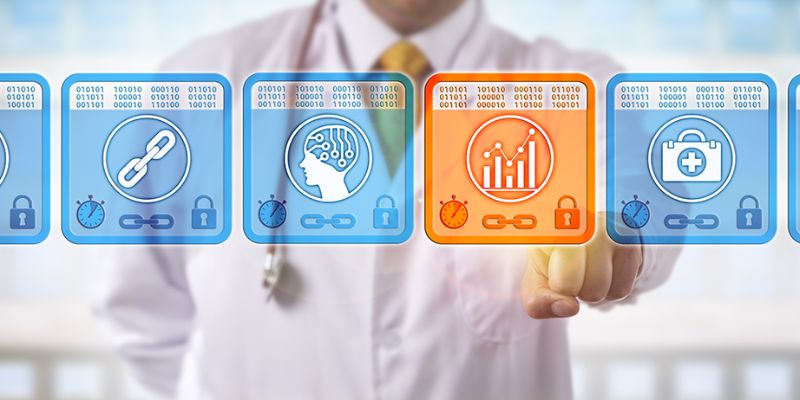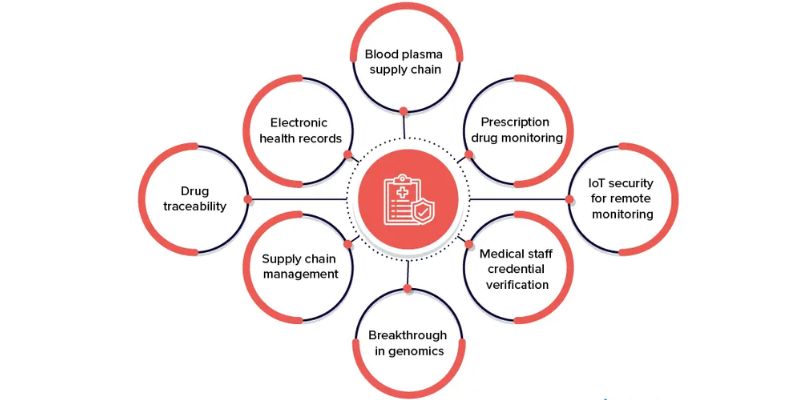Examples of blockchain in healthcare are no longer just a concept; they’re actively changing lives. Imagine a world where your medical history is locked safe from prying eyes, yet instantly accessible to your doctor. That’s the secure reality blockchain is crafting. With patients at heart, every pill you take can now be traced from maker to market, ensuring what you swallow is what the doctor ordered. And it’s not just about safety; your health plan just got smarter, cutting through red tape with contracts that talk to each other. Let’s dive into this transformative journey, where blockchain isn’t just healing the system; it’s revolutionizing healthcare outcomes.
Enhancing Patient Data Security with Blockchain Technology
Ensuring Integrity of Electronic Health Records (EHR)
Electronic Health Records, or EHR, hold all our medical info. It’s like a chest that keeps health treasures safe. But keeping them safe can be hard. That’s where blockchain helps. It links all records in a secure chain that no one can break. No one can change your medical info without leaving a clear track. This means no more lost or mixed up records. With blockchain, you’re the boss of your health info.
Addressing Healthcare Data Breaches through Advanced Encryption
Data breaches are a big worry in healthcare. Bad folks always try to steal patient info. But don’t fret! Blockchain’s like having the best lock for your health data. It uses complex coding that keeps out hackers. Every record on the blockchain is scrambled into codes. Think of it like a secret message that only you can read. This tech keeps your info safe even if bad guys come knocking. It’s a game-changer for keeping our health stories away from the wrong hands.
Streamlining Drug Traceability from Production to Patient
Combating Counterfeit Drugs within the Pharmaceutical Supply Chain
Fake drugs hurt people every day. It’s a big problem worldwide. But there is hope. Blockchain can fight this. How? By keeping close watch on drugs from start to finish.
When a drug is made, its journey begins. Every step gets recorded on the blockchain. Think of it like a super diary that never lies. Every move, every stop – the blockchain sees it all. Factories, trucks, stores – each adds info to this chain. If a bad guy tries to sneak in fake drugs, we’d know. Why? Because if it’s not in the chain, it’s not real.
Blockchain also helps with trust. Each drug gets a unique fingerprint on the chain. Stores, doctors, even you can scan it. If the fingerprint matches the chain, it’s safe. So, no more guessing if a drug is real or not. The answer is right there, clear as day.
Prescription Drug Tracking with Distributed Ledger Technology
Getting the right drug is super important. And guess what? Blockchain excels here too. Think of it as a guard that never sleeps. Your medicine gets tracked every inch of the way. Every pick up, every hand off, safely noted on the chain.
Let’s say you need medicine. The doctor writes a note. That note, turned into a digital key, locks your med’s info on the blockchain. Every step your drug takes, this digital guard checks. Is it the right drug? The right amount? The right patient? Check, check, and check. It’s all there, nothing missed.
What’s cool is, with blockchain, your data is safe. It’s like a bank vault for info. Only the right keys open the right locks. No stolen data. No mix-ups.
Also, sharing info gets easier. Doctors, hospitals, insurance – they all need to chat about your health. With blockchain, sharing is quick but also very, very safe. No leaks, no peeks from intruders. Just smooth talking between everyone who helps you get better.
From making sure your drugs are real, to tracking them to your hand, blockchain is a game-changer. It’s simple – good drugs to you, bad drugs can’t hide. In the end, you stay safe and healthy. And that’s what we all want. Because fighting fake drugs isn’t just about dollars; it’s about trust, safety, and health. It’s a fight we’re in together, and with blockchain, it’s a fight we can win.
Advancing Healthcare Delivery with Smart Contracts and HIE
Automating Processes in Medicine and Insurance
Smart contracts in medicine are changing how we think about healthcare. They help doctors and insurers work more closely. These digital contracts run on blockchain. They activate when certain conditions are met. This makes them perfect for automating tasks.
For example, when you get a check-up, a smart contract can handle the billing. It talks directly to the insurance company. After the checkup, it checks your plan. Then, it sorts out the payment without a phone call. This cuts down on waiting. Doctors can spend more time on patients, not paperwork.
Also, smart contracts make sure everyone is clear on the deal. They are open books that you can’t change. This way, patient and doctor both know what to expect. And it makes it harder for fraud to happen. This is a big win for trust in healthcare.
Enhancing Patient Privacy through Secure Health Information Exchange
Patient privacy is key in healthcare. Sharing health data between folks needs to be safe. Health Information Exchange (HIE) is how this data moves around. And now, blockchain is making HIE better. It is a tech that keeps data spread out things safe.
Blockchain lets patients control who sees their health info. Let’s say you go to a new doctor. You can give them a key to see your medical records on blockchain. This keeps your info away from unwanted eyes. The system is also hard to break into. That means your medical history, from birth to now, is safe.
Also, HIE on blockchain helps different health systems talk to each other. They often speak different tech languages. Blockchain is like a translator. So, X-rays or allergy tests can move smoothly from one place to another. Everyone involved in your care stays in the loop.
This setup helps catch mistakes in your health data, too. If there’s a wrong pill or dose in your records, it’s easier to spot. And easier to fix. And since the info is on blockchain, it stays fixed once it’s correct.
As an expert, I watch over how blockchain improves healthcare. I see it cut waits and boost safety for patients. With tech from blockchain, we are on our way to a future where healthcare is easy, swift, and safe for all. This journey is just starting. I’m here to make sure it stays on the right path.
Fostering Research and Compliance in Healthcare through Blockchain
Managing Clinical Trials Data with Immutable Record Keeping
Clinical trials are key to medical advances. They test new treatments and drugs to make sure they work and are safe. But, there’s a huge challenge: keeping track of all the data. Mistakes or missing info can cause big problems. That’s where blockchain steps in.
Imagine a digital ledger that’s shared across many places. Now, picture this ledger in a clinical trial setting. Every piece of data from the trial gets recorded and locked in. Once it’s in, no one can change it. This is what we call “immutable record keeping.”
It’s like having a super-secure vault that stores trial details. No more lost or faked results. This boosts trust in the trial’s findings. Now, let’s say a patient takes part in a trial. Their data goes on the blockchain, creating a clear record. This protects the patient’s info and helps researchers keep things in order.
Blockchain also speeds up approval of new drugs. Regulators can check blockchain stored data with ease. They find what they need fast. It’s a game changer for making sure trials are honest and keeping patient data safe.
Integrating Genomic Data for Personalized Medicine Compliance
Now, think about DNA – the stuff that makes you, you. Doctors are using DNA info to create treatments just for you, known as personalized medicine. For this to work well, we need to keep DNA data safe and correct. Guess what helps? Yes, blockchain.
With blockchain, we can safely store a person’s genomic data. This means doctors can design treatments that match their patient’s unique DNA. Also, patients control who sees their data. They give permission using something called “smart contracts.”
Blockchain helps keep the DNA info true and secure. So, medicines made just for the patient are based on the right data. This could lead to better health for everyone. It’s exciting, right?
Think about how secure sending an email feels, and then multiply that by a lot. That’s blockchain for DNA data. Each person’s genetic details are stored much safer than regular data. Thanks to blockchain, personalized medicine can really take off. We’ll see treatments that fit you like a glove, helping you stay healthy your whole life.
So that’s how blockchain helps with research and sticking to rules. It manages clinical trials without errors and looks after our most personal health data. It’s a strong, safe chain that holds our medical secrets tight. It makes sure we get medicines made just for us. And that’s why it’s a big deal in healthcare today. It helps us trust our treatments and take control of our health. And in the end, that’s what matters most.
In this post, we explored how blockchain can make health data safer and more reliable. We looked at how it keeps electronic health records accurate and helps stop data theft with better encryption.
We also saw how it can trace meds from the start to the patient, fight fake drugs, and keep prescription info safe with a shared ledger.
Next, we discussed how smart contracts and health info exchange can speed up healthcare and keep patient details private.
Lastly, we learned how blockchain helps research and sticks to rules by tracking clinical trial data and using gene info for custom medicine.
Using blockchain in healthcare can lead to more trust, better care, and safer data. It’s a game-changer for patients and caregivers. Thanks for reading and thinking about this leap forward with me. Let’s keep our health data safe and put patients first with blockchain tech!
Q&A :
How is blockchain technology being implemented in healthcare?
Blockchain technology in healthcare is paving the way for enhanced data security, patient privacy, and trust. Examples include secure and immutable storage of patient records, facilitating drug traceability to combat counterfeit drugs, and enabling health information exchanges that give patients control over their medical data. This decentralised approach is also instrumental in medical research, where blockchain can ensure the integrity and traceability of clinical trials data.
What are the benefits of using blockchain in the healthcare industry?
The healthcare industry stands to benefit greatly from blockchain through increased data security, more efficient systems, and reduced costs. Immutable data records help prevent fraud and ensure the authenticity of medical products. Additionally, it simplifies patient data management, allowing for seamless sharing between entities while preserving patient privacy. By reducing intermediaries, administrative costs are also lowered, and payment processes between stakeholders can be streamlined.
Can blockchain help with patient data management in healthcare?
Yes, blockchain can significantly improve patient data management by creating a secure, unchangeable ledger of patient health records. It enables patients to have a single, comprehensive health profile that can be shared on a need-to-know basis with various healthcare providers, reducing the risk of data loss or duplication. Furthermore, it empowers patients by giving them full control and visibility over who accesses their medical data.
What are practical examples of blockchain applications in healthcare?
Practical blockchain applications in healthcare include platforms like “MediLedger,” which is used for medication supply chain security, “Patientory,” for patient data management, and “SimplyVital Health,” which facilitates secure, permissioned access to patient records for healthcare providers. These examples showcase blockchain’s potential to ensure drug authenticity, streamline patient care coordination, and manage sensitive health data with heightened security.
How does blockchain support drug traceability in the healthcare system?
Blockchain supports drug traceability by establishing a transparent and tamper-proof record of each step a drug takes from manufacture to delivery. It provides a chronological ledger that can be accessed by manufacturers, shippers, pharmacists, and regulators. With blockchain, every transaction related to a drug’s journey is recorded, making it easier to identify and remove counterfeit drugs, ensure compliance with regulations, and enhance patient safety.


